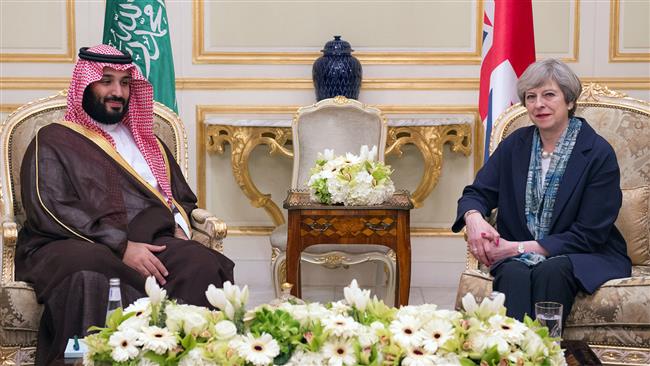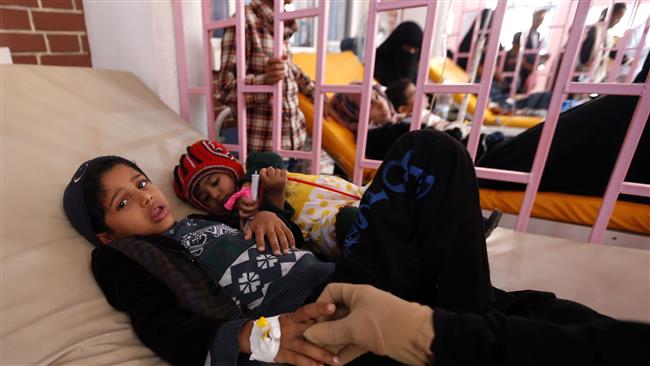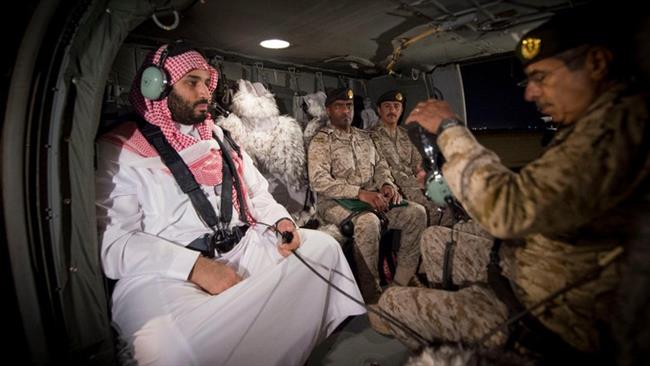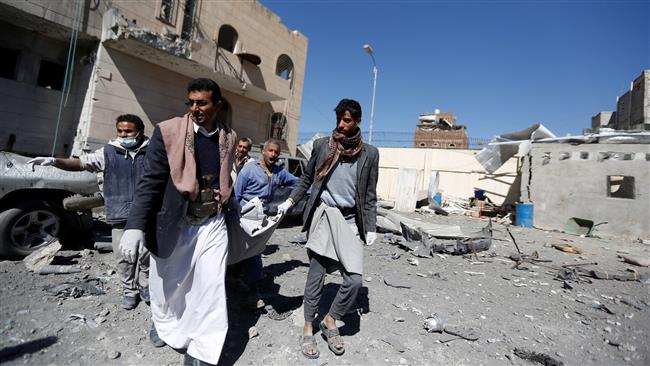UK premier invites Saudi crown prince for visit amid Yemen war crimes
British Prime Minister Theresa May has invited Saudi Arabia’s Crown Prince Mohammed bin Salman to visit the UK next year amid the international outcry over Riyadh’s ongoing war crimes in Yemen.
The Middle East Eye news portal cited a spokesperson for May’s office as saying on Thursday that the British premier discussed the 2018 trip with the crown prince and Saudi King Salman in a phone call on Wednesday, but the exact date for the visit has not been confirmed yet.
During the phone conversation, May praised Saudi Arabia’s “restraint” over a retaliatory missile attack on Tuesday by Yemeni Houthi Ansarullah fighters on Riyadh.
May’s praise comes a day after international aid organization Oxfam lashed out at Riyadh and its allies for “pushing Yemen towards apocalypse.”
Oxfam’s chief executive Mark Goldring said on Wednesday that the UK and the US, which have armed the Saudi-led coalition, are responsible for the humanitarian catastrophe caused by the war and Saudi Arabia's blockade of the impoverished nation.
Read more:

Britain is a major supporter of the bloody Saudi war against Yemen.
The May government has been under fire at home and abroad for refusing to suspend British arms sales to Saudi Arabia amid its ongoing war on Yemen.
London has, however, turned a deaf ear to critics as it sees Saudi Arabia as a trading partner that Britain would need after exit from the European Union.
According to statistics the UK’s Department for International Trade (DIT), Britain’s sales of military equipment to Saudi Arabia hit £1.1 billion in the first six months of 2017.
May has also visited Saudi Arabia several times since she became prime minister in 2016, most recently in late November.
Human rights organization Reprieve condemned the invitation of bin Salman to the UK amid the ongoing repression in Saudi Arabia, saying, “Despite the crown prince’s rhetoric of reform, the reality is that on his watch, executions have sped up, dissent has been criminalized, and juvenile protesters are facing the swordsman’s blade.”
Amnesty International also condemned Britain’s silence over Saudi Arabia’s human rights track record and Riyadh’s war on Yemen, urging May to suspend arms exports to the kingdom.
“Time and time again, UK ministers have turned a blind eye to Saudi Arabia’s atrocious human rights record - barely mentioning the country’s crackdown on peaceful opposition figures, or the alarming prevalence of torture, unfair trials and grisly executions,” said Allan Hogarth, Amnesty International UK’s head of policy and government affairs.
“Ahead of Mohammed bin Salman’s visit, Theresa May must finally do the right thing over UK arms sales - suspending all arms exports to Saudi Arabia while there’s any risk they will be used by the Saudi-led coalition to bomb civilians or enforce the crippling blockade in Yemen,” he added.
The invitation was reported on the same day that Human Rights Watch called on the UN Security Council to impose international sanctions against bin Salman, who is also the Saudi defense minister, for his leading role in the military campaign against Yemen.

Saudi Arabia has been incessantly pounding Yemen since March 2015 in an attempt to crush the popular Houthi Ansarullah movement and reinstate the former Yemeni president, Abd Rabbuh Mansur Hadi, a staunch ally of the Riyadh regime.
More than 12,000 people have been killed since the onset of the campaign more than two and a half years ago. Much of the Arabian Peninsula country's infrastructure, including hospitals, schools and factories, has been reduced to rubble due to the war.
Moreover, Riyadh has imposed a tight blockade on nearly all Yemeni air, land and sea ports, prompting human rights and charity groups to raise the alarm over the deteriorating situation in the country as people, particularly children, are increasingly suffering from the lack of food and medical supplies.
Public clemency
Saudi Arabia has intensified its airstrikes in Yemen following the death of former President Ali Abdullah Saleh.
In the latest such raids, Saudi warplanes bombed the northwestern Yemeni province of Sa’ada on Thursday, killing 11 civilians and injuring eight others.
Saleh was killed on December 4 while attempting to escape the capital Sana’a to Ma’rib province. This came shortly after he broke ranks with Houthis in favor of the Saudi-led coalition, in what Ansarullah called a “coup” against the alliance of forces defending Yemen against Saudi aggression.
On Friday, Yemen’s Supreme Political Council issued a statement, pardoning all the individuals involved in the recent unrest, which had engulfed the Yemeni capital prior to Saleh’s death.
The pardoning, however, does not include the people who have been aiding and abetting the Saudi-led forces, the statement said.
The council noted that the granting of clemency is aimed at maintaining unity among Yemenis and thwarting the enemy plots to sow discord in the country.
BP to be sued in Britain for supplying oil to Israel
VIDEO | Press TV's news headlines
Israeli strikes on north Gaza hospital ‘extremely dangerous, terrifying’: Director
VIDEO | Yemen targets Tel Aviv with Palestine 2 missiles
Pezeshkian: Iran resolved to complete North-South Transport Corridor
VIDEO | Iran-Syria: For Resistance
Qassam Brigades claims killing 3 Israeli troops in northern Gaza
More alive than ever: Sayyed Hassan Nasrallah's legacy grows stronger in martyrdom













 This makes it easy to access the Press TV website
This makes it easy to access the Press TV website